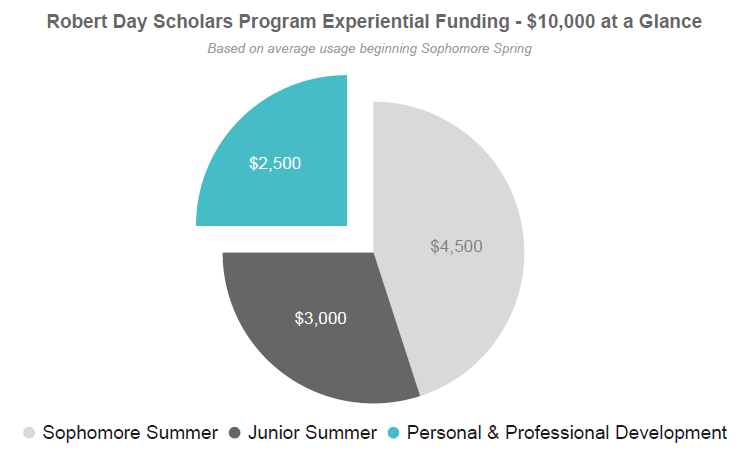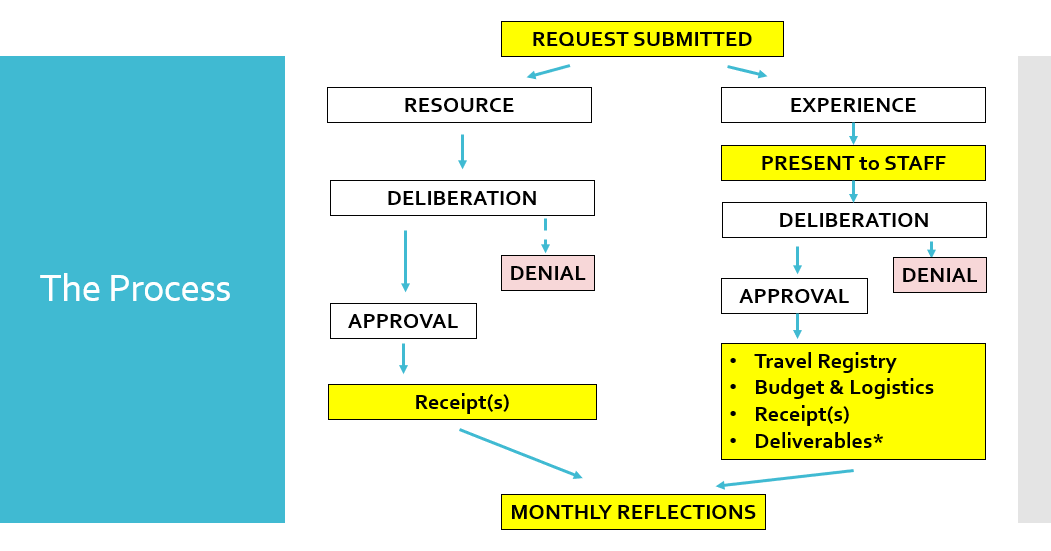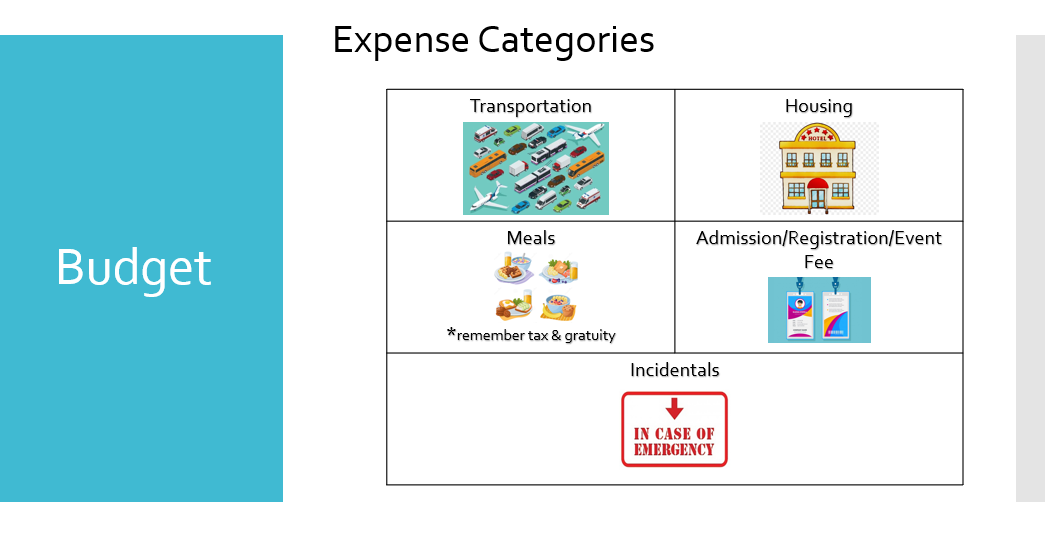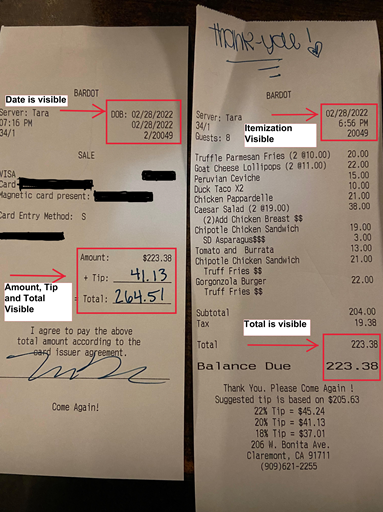Experiential Funding:
Intent of the Funding:
As a Robert Day Scholar, you have access to experiential funding to support your personal and professional development. The intent of experiential funding provided by the Robert Day Scholars Program is to provide access to resources and experiences to enhance the personal and professional development of its scholars.
Experiential learning is the epitome CMC’s ethos to “learn to do and do to learn.” We encourage each scholar to be creative with this opportunity, to push boundaries, expand comfort their zone, and be challenged in any number of ways. With that in mind, the nature of any worthwhile experiential learning should have a logical connection to their personal and professional development goals.
Scholars access funding via a formal request process reviewed by Program staff. Similar to how professionals advocate for and then reconcile use of company funds, we ask Scholars to justify their requests, provide a detailed plan for all itemized expenses, and reflect upon the resource’s or experience’s overall impact on their potential as pre-professionals. Scholars should treat each request as if they are presenting to Mr. Day himself in support of the Program mission to shape future leaders.
Responsible Steward:
In the same way we treat each Scholar’s development with focus and respect, we expect Scholars to treat the funding process with an equal level of responsibility. To illustrate this expectation, we frequently utilize the term “Responsible Steward.” This term encapsulates how we wish Scholars to treat the process from start to finish - thoughtful proposals, sensible spending of Program funds, and earnest reflections.
Professional vs. Personal Development:
Professional development refers to your learning and expansion of technical and career-aligned skills. This development is intentional training around types of roles, firms, and industries. Oftentimes professional development includes practical application and can be collaborative.
Personal development is a life-long process of setting goals and pursuing activities to enhance your awareness and identity, advance your talents, and build specific soft skills. The purpose of this development is to improve yourself for both your personal life and professional workplace.
Both professional and personal development can be targeted through accessing resources or experiences.

Policies:
Request & Approval Prior to Purchase
- Requests must be submitted and approved by staff, prior to any purchase being made.
- For trips planned during the semester, Scholars must provide written approval from professors to either miss class or join remotely for any and all classes that conflict with approved travel.
One Personal Skill Per Academic Year
- Scholars can pursue one new personal development skill per academic year, in addition to their professional development and summer funding pursuits.
- Prior to submitting a request for experiences/resources related to your personal skill for the year, we encourage students to collaborate with the RDS staff to identify a goal.
Travel-Related Experiences
- Experiences where travel will be requested, the RDS staff asks that the request is submitted no later than a month prior to the start of the experience.
- Exceptions can and may be made surrounding recruiting (interviews, superdays, etc.).
Receipts Required 14 Days from Purchase
- In order to receive funding, itemized receipts must be submitted to staff within 14 days of the original purchase.
Subscriptions on Personal Cards
- If requesting and approved to purchase a subscription, Scholars will be required to use their personal credit card, in order to avoid reconciliation issues with staff credit cards.
Meal Limit of $50 Per Person
- When requesting funding for a meal as an experience or attached to an experience, Scholars should use a $50 per person, per meal figure in their budgets.
Does Not Qualify for Funding
- Experiential funding cannot be utilized to fund a personal start-up, investment portfolio, professional clothing, tuition for classes for academic credit, textbook or materials for courses for academic credit, resources or experiences geared towards academic development, travel to and from campus at the start and end of the semester, any and all alcohol-related expenses, resources or experiences that are offered in the student experience at The Claremont Colleges, and equipment.
Deadline for Seniors to Submit Funding Requests is Spring Break
- To allow ample timing for the process, the deadline for seniors to submit final experiential funding requests is by the conclusion of Spring Break.
Request Timeline:

Budgeting:
Building a comprehensive budget is engrained in the experiential funding request process. Especially for “experience” requests, Scholars should consider all expenses and plan for contingencies that often arise when traveling. To support your planning, please use the following categories as a basic reference for the most common travel expenses.
- Transportation: airfare, Uber, subway, mileage, etc.
- Housing: hotel or Airbnb
- Meals: $50 max per person per meal
- *remember to account for tax and gratuity*
- Admissions/Tickets/Registration
- Incidentals: cushion to account for unexpected charges such as canceled flights, emergency Uber, etc.

Receipts:
Receipts must be itemized; itemization means all expenses are listed in a transaction. If the purchase includes a gratuity, the itemized receipt as well as the final receipt that shows the tip amount must be submitted. Receipts must also show the date of purchase and final total you are submitting a funding request for. Per CMC policy, we are not allowed to fund any alcohol-related purchases and if receipts have alcohol-related expenses, you must flag these expenses so that we can exclude from your funding total. Receipts must be submitted no later than 14 days after the date of purchase.

Transportation using privately-owned vehicles will be funded using the U.S General Services Administration Mileage Rate found here. This rate takes into consideration total miles traveled, gas used, and normal wear and tear compensation for miles traveled. In order to be funded using the mileage rate you must submit the following: maps showing all legs of travel, addresses of all legs, and total miles traveled.
International Purchases: In the event of international travel, receipts must be entirely translated prior to submission for funding. In addition, all currency must be converted to USD using the official currency conversion rates found here prior to submitting to the RDScholars staff.
Specific Travel Requests:
Personal Networking Treks
- Scholars should make travel-related requests for personal or professional-related treks no less than one month prior to departure date. This window gives time for Scholar presentations to staff, meeting confirmations, potential proposal amendments, and coordination of budget/travel advance.
- Personal networking treks are multi-day visits to a specific city aimed at establishing a professional network ahead of local employment in the short or long-term. Additionally, Scholars should be prepared to answer the questions “why here?” and “why now?” to reasonably justify this use of experiential funding.
- Personal networking treks are reserved for a Scholar’s final year on campus. Younger Scholars should seek travel opportunities via networking treks sponsored by the Soll Center and RDS and/or focusing an internship search in a certain location/region.
- Immediately following a Scholar’s presentation to staff, they should plan to create and share a live Google planning sheet with itinerary and budget information.
- For trips planned during the semester, Scholars must provide written approval from professors to either miss class or join remotely for any and all classes that conflict with approved travel, as well as have the majority of the networking meetings confirmed prior to approval.
Experiential Funding Pitch:
All experiential funding requests submitted for an experience will be pitched to the Robert Day Scholars Program staff. These experiences include but are not limited to: conferences, networking meals/meetings, cultural excursions, GRE/GMAT tests, etc. Once you have submitted your request for experiential funding, you will be prompted to schedule a meeting where you will present the experience in greater detail. In this pitch, be prepared to describe in detail the who, what, when, where, why and how of the proposed experience, and how it all ties to either your personal or professional development. We will also expect you to breakdown your proposed budget as well as include any updates since requesting this experience.
Robert Day Scholar Program Experiential Funding Proposal
Keeping with CMC’s mission to “educate students for thoughtful and productive lives and responsible leadership,” approval to use experiential funding will be dependent upon the quality of your proposal:
Timeliness – Have you submitted your proposal far enough in advance of your proposed experience to allow for the completion of the evaluation process?
Economy & Efficiency – How does your proposal reflect that your plan is the most economical and efficient means to achieve the intent of your experience?
Comprehensiveness – Have you provided a thorough and thoughtful response for each section of the proposal? Have you addressed any additional questions that you anticipate we might have?
Upon receiving approval for your proposal, and prior to your experience, you will be responsible for completing the CMC Travel Registration and submitting the confirmation email to Prag Shah if your proposal includes travel off campus. Aside from providing a measure of accountability for the use of institutional funds for student learning, completion of the Travel Registration ensures that CMC staff know your whereabouts, which is especially important in the event of an emergency.
Experiential Funding Share-Out Session
If you are approved for a resource or experience, you will attend a Share-Out Session with fellow scholars at the end of the month. We will use these Sessions to discuss what you did, what you learned, and if you would recommend it to other scholars.
Changes to Your Proposal
If the details of your approved proposal change, you are obligated to let Prag Shah know as soon as possible. Failure to do so will impact future requests for use of experiential funding.
HELPFUL LINKS:
